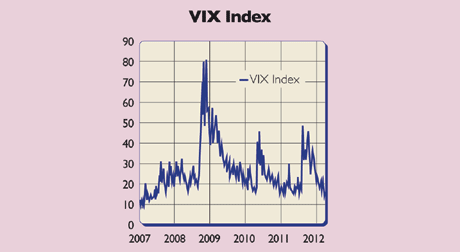Volatility tracker funds are not all they seem
The US equity market’s volatility index, the VIX, is trading at its lowest level for two years. That means volatility is likely to increase. So does that mean it's a good time to buy a fund that tracks the VIX? Maybe not, says Paul Amery.

Get the latest financial news, insights and expert analysis from our award-winning MoneyWeek team, to help you understand what really matters when it comes to your finances.
You are now subscribed
Your newsletter sign-up was successful
Want to add more newsletters?

Twice daily
MoneyWeek
Get the latest financial news, insights and expert analysis from our award-winning MoneyWeek team, to help you understand what really matters when it comes to your finances.

Four times a week
Look After My Bills
Sign up to our free money-saving newsletter, filled with the latest news and expert advice to help you find the best tips and deals for managing your bills. Start saving today!
The US equity market's volatility index, the VIX, is trading at its lowest level for two years (see chart). As volatility tends to trade in a range, oscillating between periods of market calm (when the index is low) and moments of crisis (when it spikes), isn't now a good time to buy the VIX via an exchange-traded fund (ETF)?
Not so fast. You can't buy the VIX directly, just as you are not buying actual barrels of crude with an oil ETF. Instead, in both cases you are exposed to indices based on futures contracts. And the problem here is that when the current (or spot') price of equity market volatility, as shown by the VIX, is low (as now), those futures contracts tend to anticipate a rise in volatility.
So when tracker funds have to roll their positions from expiring futures contracts into those with longer-term expiry dates, they face a constant headwind. This contango', another term for the headwind, can wipe out any gains you might anticipate from a rise in spot VIX.
MoneyWeek
Subscribe to MoneyWeek today and get your first six magazine issues absolutely FREE

Sign up to Money Morning
Don't miss the latest investment and personal finances news, market analysis, plus money-saving tips with our free twice-daily newsletter
Don't miss the latest investment and personal finances news, market analysis, plus money-saving tips with our free twice-daily newsletter
For example, in the first three quarters of 2011, the VIX rose by 142% as Europe's sovereign-debt crisis grew. But VXX, a US-listed exchange-traded note (ETN) tracking short-term VIX futures, rose only 42% over the same time. The 100% difference in return was all due to contango. Worse, naive' volatility trackers such as this have proved a terrible long-term investment. Since its launch in 2009, VXX has lost 96% of its value. And while the current mid-teens level of the VIX index is the same as in April 2010, VXX is down 78% over the same period.

More recently, issuers have focused on launching volatility trackers that aim to offset some of the effects of contango. For example, Source's Nomura Voltage Mid-Term ETF switches between volatility futures and cash, based on an algorithm that compares the current VIX level with the previous month's average. This fund has over $500m in assets and represents a much better bet than a simple long-only volatility futures position. But it's not cheap. On top of a 0.3% annual management fee, you pay a 0.8% index fee and a 0.075% levy on any rebalancing. With the index's high internal turnover, total charges reach several per cent a year.
Given the complexity and costs involved, investors are better off giving volatility ETFs a miss and using the VIX as a simple signal to manage market exposure. Trim your shareholdings when the VIX is low, as now, and buy when it spikes again.
Paul Amery edits www.indexuniverse.eu .
Get the latest financial news, insights and expert analysis from our award-winning MoneyWeek team, to help you understand what really matters when it comes to your finances.
Paul is a multi-award-winning journalist, currently an editor at New Money Review. He has contributed an array of money titles such as MoneyWeek, Financial Times, Financial News, The Times, Investment and Thomson Reuters. Paul is certified in investment management by CFA UK and he can speak more than five languages including English, French, Russian and Ukrainian. On MoneyWeek, Paul writes about funds such as ETFs and the stock market.
-
 Early signs of the AI apocalypse?
Early signs of the AI apocalypse?Uncertainty is rife as investors question what the impact of AI will be.
-
 Reach for the stars to boost Britain's space industry
Reach for the stars to boost Britain's space industryopinion We can’t afford to neglect Britain's space industry. Unfortunately, the government is taking completely the wrong approach, says Matthew Lynn
